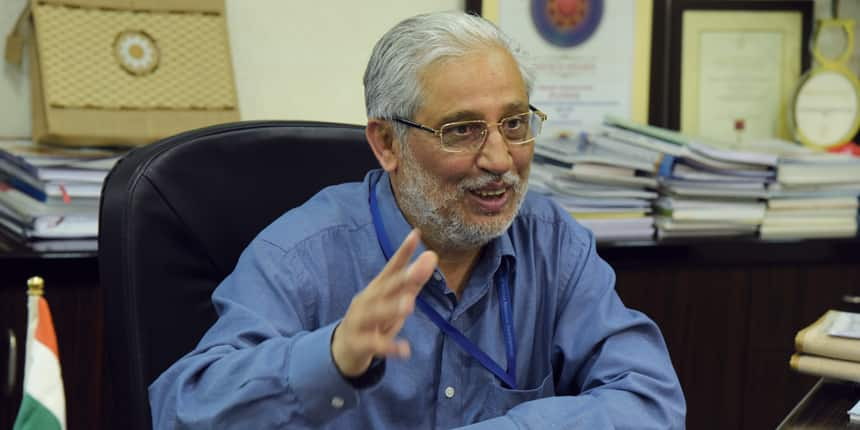Why AICTE does not allow credit transfer for all online courses
Abhay Anand | January 13, 2021 | 11:00 AM IST | 4 mins read
AICTE chairman, Anil Sahasrabudhe, explains why only a small fraction of online courses are allowed to to join the framework of formal higher education.

NEW DELHI: While the MOOC scene is as broad as it is diverse, India’s policy-makers can allow only a small fraction of them to join the more regimented framework of formal higher educational programmes. The All India Council for Technical Education (AICTE) chairman, Anil D. Sahasrabudhe explained why these courses are important, which fields benefit most and why, despite teaming up with industry, regulators are wary about credit-transfers.
Q. The AICTE has collaborated with industry to offer free training in technologies like AI, IoT, data science and cloud computing. What was the idea behind such collaborations?
A. AICTE has collaborated with Microsoft where it is offering free certificate courses to students. It is also offering various popular and certified courses which are in high demand and under this students will also get a stipend of something around US $100.
We have collaborated with Microsoft and many such multinational corporations and industry bodies like Confederation of Indian Industry (CII) and NASSCOM (National Association of Software and Service Companies) to improve the employability of youth in the country by providing various skill sets.
Q. Is the AICTE working on a mechanism where it will allow credit transfer from certificate courses to a full-time degree or diploma course?
A. No, there is no such proposal as of now, nor do we intend to do so. If a college, after enrolling a student upon conducting an entrance test, is imparting skills to its students through these online certificate courses, in that case, we do not have any problem. We can-not give this credit transfer facility to the industry.
If tomorrow there is a facility of credit transfer, someone will come and dilute things and start saying in the market that they are offering credits after Class 12 – that will not be good.
Then, if someone is associated with a service provider as a trainer and tomorrow he leaves, who will take the classes? How will the assessment be conducted? There is no mechanism in place to deal with these situations and we cannot allow that.
We are allowing credit transfer only for courses offered through SWAYAM (Study Webs of Active-Learning for Young Aspiring Minds) which is an Indian Massive Open Online Course (MOOC) platform, where courses are offered by reputed government institutions and their faculty members.
Q. In the last eight months, since lockdown was imposed, online certificate courses have mushroomed. Is AICTE mulling on regulations for these?
A. No, there is no such plan right now. When we are not allowing credit transfer for certificate courses offered by anyone other than SWAYAM and recognised institutions, then the question of regulation does not arise at all. We will not be doing it as we are not sure how someone will perform in the longer run.
The certificate courses are meant to enhance skills, skill development of candidates and if an educational institution is offering these courses to its students, we do not have any problem. However, if an outsider from the industry starts offering some course of four-five credits, who is going to monitor that? It is not possible and so, we are not doing it.
Q. What according to you are the emerging trends in the online certification segment?
A. I think all emerging areas of technology which we keep talking about, including artificial intelligence (AI), machine learning (ML), deep learning (DL), IoT (internet of things), data science and augmented reality, have a huge demand for skilled people.
Q. Is online education replacing or will it replace the distance mode of education in coming times?
A. In my opinion, there is no difference between the two modes of education, online education and open and distance learning (ODL) mode. The only difference is that earlier, the educational content was transported in the form of notes and study materials. This is now being done by sending pdf files. So, I do not see the two modes of education as different.
Online education certainly has an advantage over ODL mode as a student can watch the recorded lecture any time as per his convenience and alos watch the person delivering the lecture within a given time table. In the ODL mode, students are called for classes to a study centre once a week. In online education it is almost like attending the classroom in virtual mode. So, I think online is a little ahead of the ODL mode of education.
Also Read:
- NCPCR to NIOS: 'Look into demand for online exams, syllabus reduction'
- Treat as representation PIL to dispense with CBSE class 10, 12 board exams: HC
Write to us at news@careers360.com.
Follow us for the latest education news on colleges and universities, admission, courses, exams, research, education policies, study abroad and more..
To get in touch, write to us at news@careers360.com.
Next Story
]AICTE mandates internship for engineering students
New Delhi: With an aim to expose engineering students to industry work practices and ground-level work, the All India Council of Technical Education (AICTE), the country’s technical education regulator, has mandated internships for students by introducing credits for the same in the overall evaluation scheme.
Abhay Anand